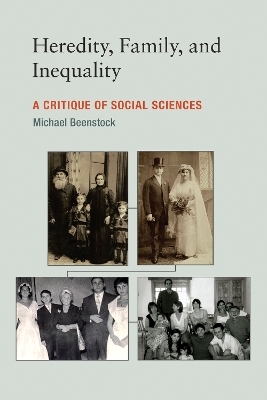
Heredity, Family, and Inequality
A Critique of Social Sciences
Seiten
2012
MIT Press (Verlag)
978-0-262-01692-6 (ISBN)
MIT Press (Verlag)
978-0-262-01692-6 (ISBN)
- Keine Verlagsinformationen verfügbar
- Artikel merken
An economist critiques nature versus nurture hypotheses from behavioral genetics, developmental psychology, sociology, and economics.
Empirical literature in disciplines ranging from behavioral genetics to economics shows that in virtually every aspect of life the outcomes of children are correlated to a greater or lesser extent with the outcomes of their parents and their siblings. In Heredity, Family, and Inequality, the economist Michael Beenstock offers theoretical, statistical, and methodological tools for understanding these correlations. Beenstock presents a comprehensive survey of intergenerational and sibling correlations for a broad range of outcomes-including fertility and longevity, intelligence and education, income and consumption, and deviancy and religiosity. He then offers a critique of the sometimes conflicting explanations for these correlations proposed by social scientists from such disciplines as developmental psychology, sociology, and economics.
Beenstock also provides an axiomatic framework for thinking about the complex interplay of heredity, family, and environments, drawing on game theory, control theory, and econometrics. Chapters 1-7 discuss such topics as the important contributions of Francis Galton (1822-1911) to the statistical study of heredity, the family as an engine of inequality and diversity, and natural experiments designed to identify how environments, families, peer groups, and neighborhoods affect human outcomes. Chapters 8-10 present technical material on statistical, theoretical, and methodological tools used by the earlier chapters.
Beenstock's goal is not to argue for either nature or nurture but to suggest more rigorous ways to assess the diverse contributions to this lively debate.
Empirical literature in disciplines ranging from behavioral genetics to economics shows that in virtually every aspect of life the outcomes of children are correlated to a greater or lesser extent with the outcomes of their parents and their siblings. In Heredity, Family, and Inequality, the economist Michael Beenstock offers theoretical, statistical, and methodological tools for understanding these correlations. Beenstock presents a comprehensive survey of intergenerational and sibling correlations for a broad range of outcomes-including fertility and longevity, intelligence and education, income and consumption, and deviancy and religiosity. He then offers a critique of the sometimes conflicting explanations for these correlations proposed by social scientists from such disciplines as developmental psychology, sociology, and economics.
Beenstock also provides an axiomatic framework for thinking about the complex interplay of heredity, family, and environments, drawing on game theory, control theory, and econometrics. Chapters 1-7 discuss such topics as the important contributions of Francis Galton (1822-1911) to the statistical study of heredity, the family as an engine of inequality and diversity, and natural experiments designed to identify how environments, families, peer groups, and neighborhoods affect human outcomes. Chapters 8-10 present technical material on statistical, theoretical, and methodological tools used by the earlier chapters.
Beenstock's goal is not to argue for either nature or nurture but to suggest more rigorous ways to assess the diverse contributions to this lively debate.
Michael Beenstock is Professor of Economics at Hebrew University of Jerusalem.
| Reihe/Serie | Heredity, Family, and Inequality |
|---|---|
| Zusatzinfo | 16 figures, 48 tables |
| Verlagsort | Cambridge, Mass. |
| Sprache | englisch |
| Maße | 152 x 229 mm |
| Gewicht | 771 g |
| Themenwelt | Geisteswissenschaften ► Psychologie ► Psychoanalyse / Tiefenpsychologie |
| Sozialwissenschaften ► Soziologie ► Mikrosoziologie | |
| Wirtschaft ► Volkswirtschaftslehre ► Ökonometrie | |
| ISBN-10 | 0-262-01692-3 / 0262016923 |
| ISBN-13 | 978-0-262-01692-6 / 9780262016926 |
| Zustand | Neuware |
| Haben Sie eine Frage zum Produkt? |
Mehr entdecken
aus dem Bereich
aus dem Bereich
vom Mythos zur Psychoanalyse des Selbst
Buch | Softcover (2023)
Kohlhammer (Verlag)
CHF 39,20
Grundlagen, Behandlungstechnik und Anwendung
Buch | Softcover (2022)
Kohlhammer (Verlag)
CHF 48,95
den Stand der Traumaverarbeitung erkennen und Behandlungsschritte …
Buch | Hardcover (2023)
Klett-Cotta (Verlag)
CHF 49,95


